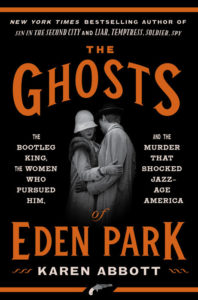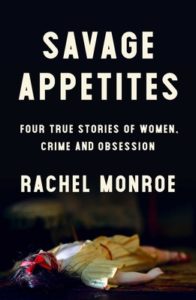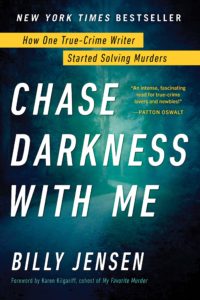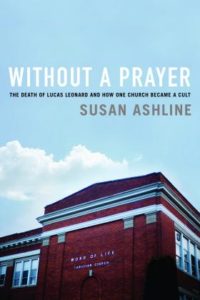These are boom days for writers and readers looking for thoughtful, hard-hitting stories about real-life crime. Whether you’re in the mood for a high-octane page-turner, an investigation, or a penetrating memoir, chances are there’s a book (and many a podcast or docu-series) out there for you. Every month, we round up the best new crime non-fiction with recommendations from CrimeReads staff. Here are the selections for August:
Karen Abbott, The Ghosts of Eden Park (Crown)
As she did with Liar, Temptress, Soldier, Spy and American Rose, the consummate historian Karen Abbott brings to life another fascinating, long-buried story about an incredible and accomplished woman. Ghosts of Eden Park begins in the Jazz Age, at the dawn of prohibition, and profiles Mabel Walker Willebrandt, the brilliant, disabled, and widely-underestimated young lawyer who worked tirelessly to take down George Remus, the Bootlegger King of America. It’s an effervescent, zigzagging tale of lust, greed, power, and murder, written with Abbott’s signature shrewdness and wit—a historical true-crime story, and a real-life unstoppable heroine, with style, moxie, and verve.
Rachel Monroe, Savage Appetites (Scribner)
Rachel Monroe’s new collection of essays is as intense as its title; Monroe has always been fascinated by those who become obsessed with crimes they have no personal claim to, and uses a true crime convention as a jumping off point to discuss the many archetypes of female obsession with true crime, each archetype dissected through the story of a single woman’s obsession with some element of true crime. Savage Appetites is required reading for those who understand that women aren’t just reading true crime to protect ourselves—we’re investigating cold cases, getting close to the families of victims, leveraging power to get men to embrace the validity of our “hobbies,” and much more.
Billy Jensen, Chase Darkness with Me (Sourcebooks)
The true crime boom is a relatively recent phenomenon but journalist Billy Jensen has been investigating and reporting on unsolved killings and disappearances for decades. (He’s also the one who was called in to work on Michelle McNamara’s unfinished investigation into the Golden State Killer.) In Chase Darkness with Me, Jensen offers up an intimate portrait of his life researching crime, bringing readers into the search for truth and some manner of justice. For the budding true crime obsessives out there, this is a must-read chronicle of one writer’s life and times.
Joanna Jolly, Red River Girl (Viking)
A thoroughly researched, behind-the-scenes look at the investigation of the 2014 killing of Tina Fontaine, Red River Girl is also a look at the sadly repeating stories of young indigenous women in Canada gone missing and dead without justice. Fontaine grew up on the Sagkeeng First Nation Reserve and was killed in the regional capital, Winnipeg, failed by the system and revealing its holes, especially to one dogged detective determined to get to the bottom of the case. Jolly is an experienced reporter with an eye for investigative detail as well as a sense of the greater importance of the story she’s researching.
Susan Ashline, Without a Prayer (Pegasus)
The Life Christian Church in upstate New York made up a cloistered community of believers, one that eventually transformed into a cult. When one of its young members, Lucas Leonard, confessed to church members he’d been experimenting with witchcraft and had even plotted to kill his parents, their fervor spilled over and they beat the young man to death. That murder rocked the community, and opened up questions about how things had gone so terribly far. Ashline presents a clear-eyed chronicle of the church’s descent into their own hell, and tells a larger story about faith and society in modern America.

Anthony M. DeStefano, Gotti’s Boys (Citadel)
Anthony M. DeStefano, longtime true crime reporter and mafia expert, takes us through the rise and spectacular fall of John Gotti, once known as the “Teflon Don” for his ability to brush off all attempts by law enforcement to bring him down, only to be undone by a sophisticated surveillance campaign even as the FBI bungled efforts to recruit (and then protect) informants. A gripping saga for all those interested in organized crime.
William Rosenau, Tonight We Bombed The U.S. Capital (Atria)
In the 1970s, a group of women activists came together and named themselves M19, after the birthday of Malcolm X and Ho Chi Minh. They were dedicated to using violent means to oppose capitalist ills, and were entirely women-led, unlike other radical groups that emerged from 1960s activism. Rosenau first became fascinated by this group while working for the Rand Corporation, a conservative think tank, and while his background meant it was impossible to interview the women themselves, plenty of archival sources stepped in to fill out the gaps for a fascinating narrative of women taking power into their own hands.























